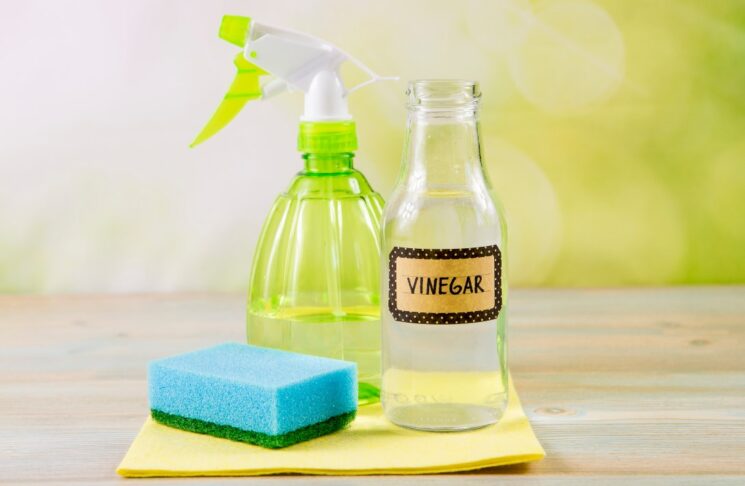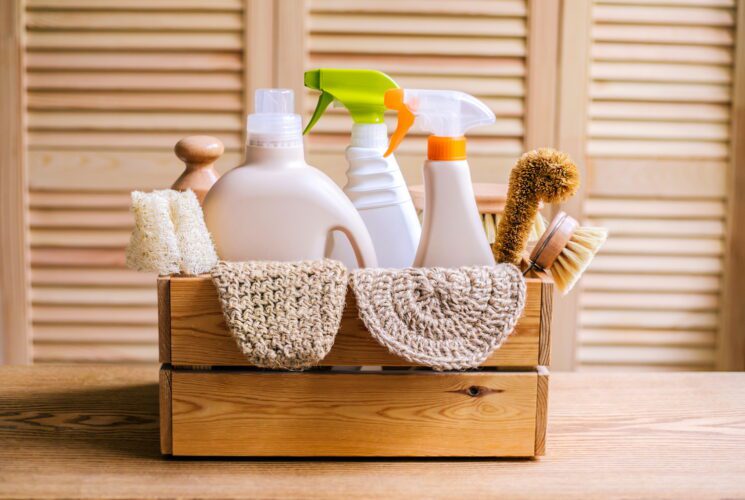It’s hard to keep your house totally germ-free. In fact, it’s actually pretty much impossible. Some germs aren’t necessarily bad.
Being exposed to some germs is good for your immune system. But you obviously don’t want your house to be full of bad germs. During flu season, this can be particularly tricky.
The key to having a germ-free house is having a clean house. Using processed chemical cleaning supplies will kill the good germs as well as the bad. Instead, use some of these natural alternatives.
In This Post
Vinegar

Vinegar is actually an ingredient in a lot of cleaning products. If vinegar isn’t in the cleaning product, there is probably something similar. That’s because vinegar is a fermented product. Fermentation is a natural process that creates chemicals that are good for cleaning.
This is because these products contain a high acidity level. Acid is a natural germ-killer. Other things that are high in acidity are citrus fruits.
So if you’re looking for a natural cleaning material, just squeeze some lemons. Fresh lemon juice will go bad quickly, though.
The advantage of vinegar is its long shelf life. Simply mix vinegar and water and you’ll have a great all-natural and all-around cleaning spray.
If you don’t like the smell, add more water.
Aeration
Oxygen is really a magical ingredient. Think about how nice you feel when you take in a deep breath of fresh air. Aeration cleans out more than just your lungs. It clears out dust, germs, and anything else that might be sitting around your house.
Aeration is also the best way to get bad smells out of your home. This is important if you have guests coming over. And it’s nice to have a home that smells fresh and clean.
If you smoke, aeration is especially important. Here’s an article from Veriheal that has some tricks on getting smells out of your apartment. An air conditioning system is not the best way to aerate. An air conditioner doesn’t actually produce any new air. It just re-filters the same air over and over again into the same space.
So, if you have germs in the air, an air conditioner is only going to spread them. It’s better to have a fan that won’t recycle the same air. Open your windows in the morning and at night. If you open the windows during the middle of the day, you’ll only let in more hot air.
This can be a pain during the winter, but it’s necessary.
Light
Light will kill germs, especially natural light. This might sound surprising because light seems like it’s just light. But there are actually tiny particles that are transported through sunlight.
Keep your curtains open for several hours to let in a lot of light. This can be tricky if it’s really hot and you don’t want to let the heat in. The morning and evening are the best times to let natural light in. Infrared lights are also handy if you can find them.
Infrared technology is used to professionally clean swimming pools, saunas, and other spaces. It can also work in your home.
Baking Soda
![]()
Baking soda is another natural product that can be used for cleaning. One of the main advantages of baking soda is that it’s so cheap. It’s also extremely versatile. Here’s a list from Healthline of things that it can be used for.
In addition to cleaning, baking soda can also be used to make a natural toothpaste. It might taste strange, but it’s effective.
It’s another good product for cleaning stains out of fabrics. When combined with vinegar, it can also be used to clean clogged drains. You can find baking soda at every grocery store.
Temperature
Germs and viruses cannot survive at all temperatures. Viruses actually live longer on cold surfaces. This is because they can freeze relatively easily. This is one reason why people are more likely to get viruses in winter.
However, certain viruses thrive in the heat. High temperatures also lead to an increase in mold, which is dangerous.
Try to keep your house at a neutral temperature. Also make sure that the air is not too humid. Germs thrive in humid, murky environments. Keep things dry and well-aerated.
Oil
People are often surprised that oil can be used to clean things. And to be fair, oil isn’t something you just want to pour on the floor or down the sink. It isn’t a substance that should be used to clean everything.
But if you’re looking to polish some furniture, especially wood, oil is great.
Just drizzle a few drops on your wood table or chairs. Then use a rag to rub the oil around the wood. While you may not want to use these for cleaning, here is a list from Tasting Table of some of the best olive oils. Olive oil can be used for furniture polishing, but other oils work just as well.
Olive oil does have a distinct color and scent, though. If you already have olive furniture or an olive cutting board, it’s the best oil to use.
Oil can also be used for personal hygiene. If your skin is very dry, a bit of oil could help. You can also use oil to make hand-made soaps.
Water
When it comes to cleaning, water actually does most of the work. However, not all water is equal. Just look at the water aisle in the grocery store and you’ll see how many options there are.
For cleaning, distilled water is the best option. Distilled water is what hospitals and professional cleaners use when they need to clean.
Distilled water has been distilled several times to remove the water of any minerals and other chemicals that could get in the way of cleaning. However, distilled water is not designed for drinking.
If you don’t want to buy water, filter your water before using it to clean.
Conclusion

It takes some effort to have a clean and germ-free home, but it isn’t impossible. With these five simple solutions, you can rest easy, knowing that your home is clean and germ-free while also being natural and eco-friendly.